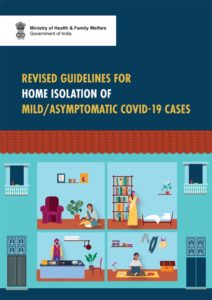Coronaviruses are a large family of viruses which may cause illness in animals or humans. In humans, several coronaviruses are known to cause respiratory infections ranging from the common cold to more severe diseases such as Middle East Respiratory Syndrome (MERS) and Severe Acute Respiratory Syndrome (SARS). The most recently discovered coronavirus causes coronavirus disease COVID-19. Most people infected with the COVID-19 virus will experience mild to moderate respiratory illness and recover without requiring special treatment. Older people and those with underlying medical problems like cardiovascular disease, diabetes, chronic respiratory disease, and cancer are more likely to develop serious illness. The best way to prevent and slow down transmission is to be well informed about the COVID-19 virus, the disease it causes and how it spreads.
Spread of Corona Virus
Person-to-person spread
The virus can spread from person-to-person if they are in close contact with one another (within about 6 feet) or tthrough respiratory droplets produced when an infected person coughs or sneezes. These droplets can land in the mouths or noses of people who are nearby or possibly be inhaled into the lungs.
Spread from contact with infected surfaces or objects
It may be possible that a person can get COVID-19 by touching a surface or object that has the virus on it and then touching their own mouth, nose, or possibly their eyes.
Spread of the virus from apparently Healthy Person
People can be most contagious when they are symptomatic. Some spread might be possible before people show symptoms. Many people with COVID-19 experience only mild symptoms. This is particularly true at the early stages of the disease. It is therefore possible to catch COVID-19 from someone who has, for example, just a mild cough and does not feel ill.
Incubation Period of Corona Virus
The incubation period for a virus is the time between catching the virus and showing symptoms of disease. For the novel coronavirus (COVID-19), health officials estimate an incubation period of between one and 14 days. Most people start showing symptoms about five days after becoming infected.
Symptoms
Prevention of Corona Virus Disease
There is currently no vaccine to prevent coronavirus disease 2019 (COVID-19). The best way to prevent illness is to avoid being exposed to this virus. However, everyday preventive actions are recommended to help prevent the spread of respiratory diseases, including:
- Avoid close contact with people who are sick.
- Avoid touching eyes, nose and mouth. Hands touch many surfaces and can pick up viruses. Once contaminated, hands can transfer the virus to your eyes, nose or mouth and can thus enter your body.
- Practice respiratory hygiene i.e. Cover your cough or sneeze with a tissue, then throw the tissue in the trash.
- Clean and disinfect frequently touched objects and surfaces using a regular household cleaning spray or wipe.
- Wash your hands often (more often than usual) with soap and water for at least 20 seconds, especially after going to the bathroom; before eating; and after blowing your nose, coughing, or sneezing.
- If soap and water are not readily available, use an alcohol-based hand sanitizer with at least 60% alcohol. Always wash hands with soap and water if hands are visibly dirty.
- Stay home when you are sick. If you have any or all of fever, cough and difficulty breathing, seek medical attention immediately.
- Avoid Hugging and shaking hands while greeting.
- Drink plenty of water/liquid and take nutritious food.
- Recommendations for using a facemask.- WHO/CDC does not recommend wearing a facemask to protect themselves from respiratory diseases, including COVID-19 unless anyone show symptoms of COVID-19 to help prevent the spread of the disease to others. The use of facemasks is also crucial for health workers and people who are taking care of someone in close settings (at home or in a health care facility).
- Role of antibiotics in preventing and treating the new coronavirus- Antibiotics do not work against viruses, only bacteria. The new coronavirus (2019-nCoV) is a virus and, therefore, antibiotics should not be used as a means of prevention or treatment. However, if someone is hospitalized for the 2019-nCoV, he/she may receive antibiotics because bacterial co-infection is possible.
- Protection measures for persons who are in or have recently visited (past 14 days) areas where COVID-19 is spreading- Follow the guidance outlined above.
- Stay at home if you begin to feel unwell, even with mild symptoms such as headache and slight runny nose, until you recover. Avoiding contact with others and visits to medical facilities. This will allow these facilities to operate more effectively and help protect you and others from possible COVID-19 and other viruses.
If you develop fever, cough and difficulty breathing, seek medical advice promptly as this may be due to a respiratory infection or other serious condition. Call in advance and tell your provider of any recent travel or contact with travellers. This will allow your health care provider to quickly direct you to the right health facility. This will also help to prevent possible spread of COVID-19 and other viruses.
Revised Guidelines for Home Isolation of Mild/ Asymptotic COVID-19 cases
Ministry of Health and Family Welfare, Government of India recently issued revised guidelines on home isolation of mild/ asymptotic COVID-19 cases
As per the guidelines, the patients who are clinically assigned to be mild/asymptomatic are recommended for home isolation.
The asymptomatic cases are laboratory confirmed cases not experiencing any symptoms and having oxygen saturation at room air of more than 94%.
Clinically assigned mild cases are patients with upper respiratory tract symptoms (&/or fever) without shortness of breath and having oxygen saturation at room air of more than 94%.
For further information please log on – https://www.mohfw.gov.in/
Awareness Materials – https://www.mohfw.gov.in/
Central Helpline Number for corona-virus: – +91-11-23978046
WhatsApp helpline number to get information and clear myths on coronavirus. The number is 9013151515. To get any information on coronavirus, all you have to do is send a ‘Namaste’ to this number on WhatsApp

